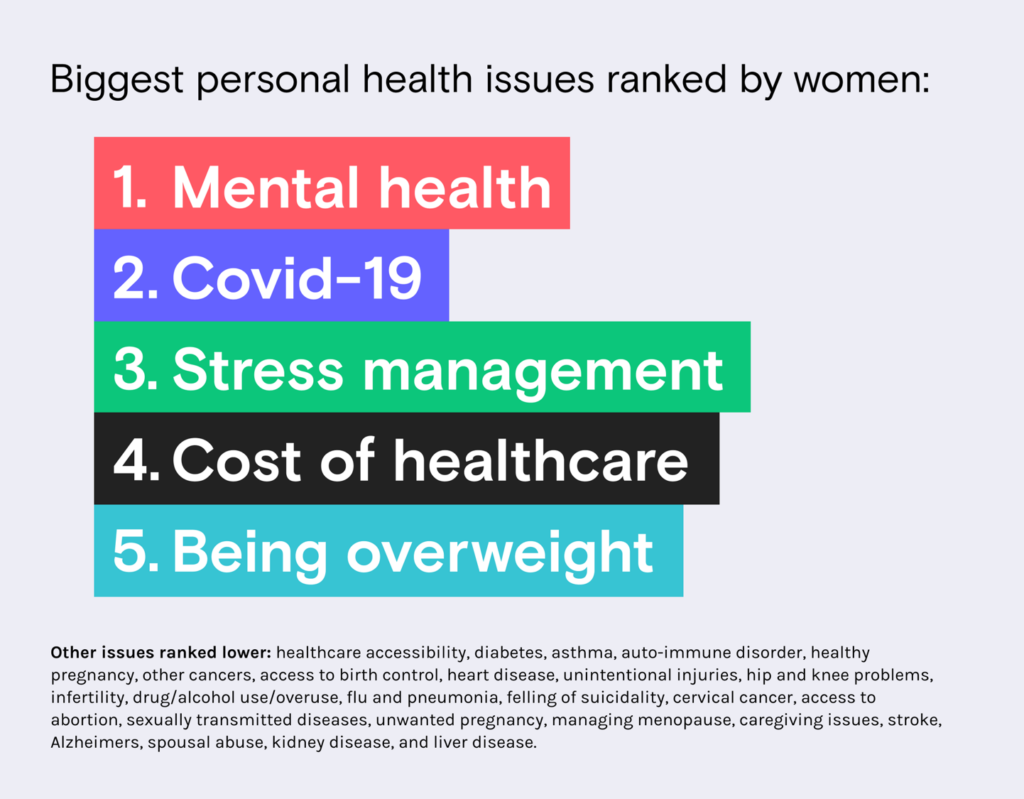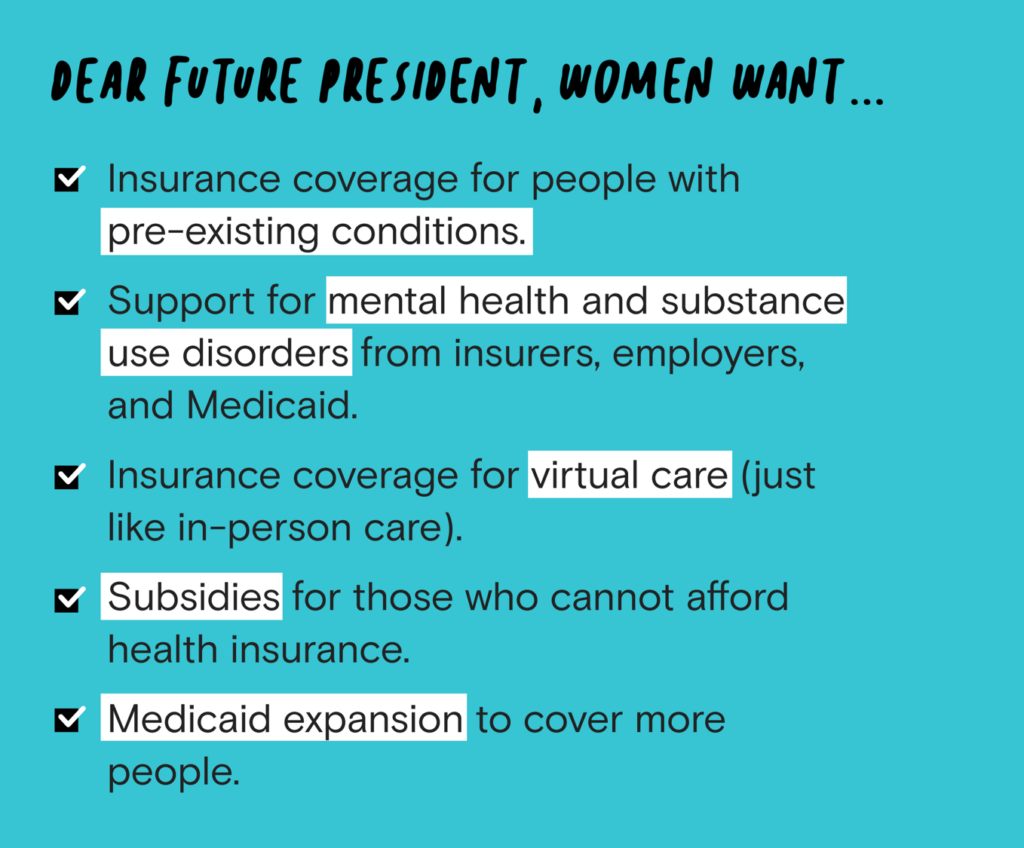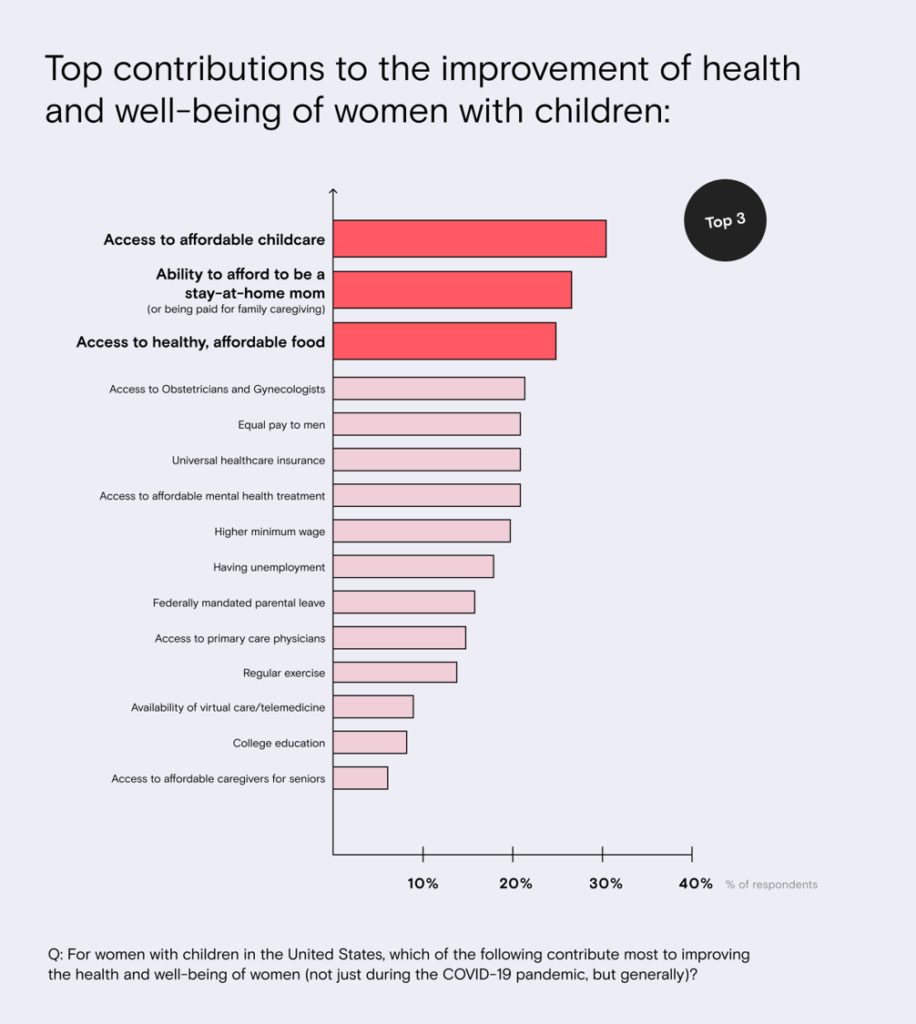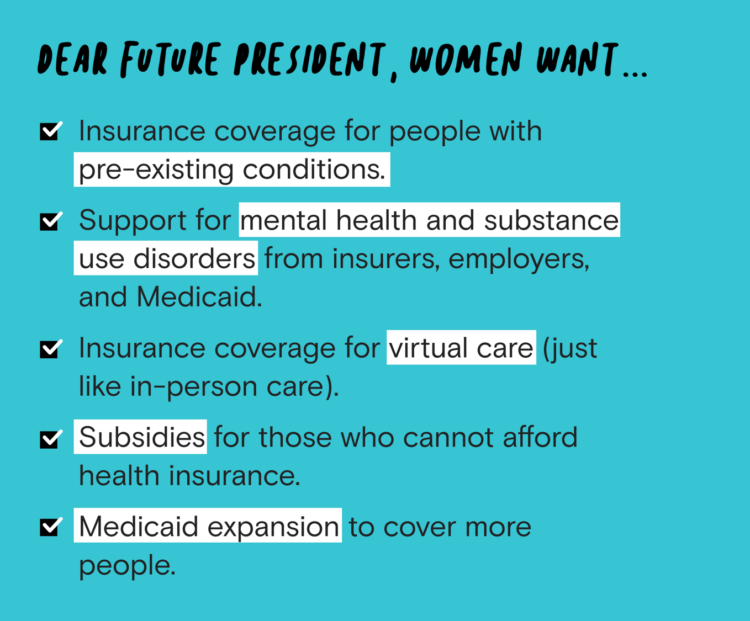2020 marked the centennial anniversary of the 19th Amendment to the U.S. Constitution, giving women the right to vote. In this auspicious year for women’s voting rights, as COVID-19 emerged in the U.S. in February, women’s labor force participation rate was 58%.
Ironic timing indeed: the coronavirus pandemic has been especially harmful to working women’s lives, the Brookings Institution asserted last week in their report in 19A: The Brookings Gender Equality Series.
 A new study from Tia, the women’s health services platform, looks deeply into COVID-19’s negative impacts on working-age women and how they would advise the next occupant of the White House on health policy in Dear Future President — What Women Want for Healthcare in America. Tia collaborated with Manatt Health and Merrill Research on this insightful research.
A new study from Tia, the women’s health services platform, looks deeply into COVID-19’s negative impacts on working-age women and how they would advise the next occupant of the White House on health policy in Dear Future President — What Women Want for Healthcare in America. Tia collaborated with Manatt Health and Merrill Research on this insightful research.
The survey polled 900 women in the U.S. ages 22 to 45 years old in September 2020. Women were surveyed on perspectives for health care in America in the wake of the COVID-19 pandemic, the prospects for the Affordable Care Act and health insurance security, and views on health, well-being, and health care.
Women identified the top five personal health issues they face as:
- Mental health
- COVID-19
- Stress management
- The cost of healthcare, and
- Being overweight.
What we see from this list is that women prioritize mental and financial health above “medical care” in the wake of the coronavirus pandemic and converging economic and social/civil impacts. Clearly, women define “women’s health” beyond reproductive medicine.
 When it comes to health care priorities, there was more agreement than disagreement among the women in the study: women see their health and well-being through many lenses: physical, mental, emotional, social, and financial.
When it comes to health care priorities, there was more agreement than disagreement among the women in the study: women see their health and well-being through many lenses: physical, mental, emotional, social, and financial.
This concurrence was relatively consistent across demographics like age, income, geography, race and ethnicity and “even political party,” the report notes, for health policy specifics such as:
- ensuring coverage for pre-existing conditions
- coverage and payment parity for mental health
- insurance coverage for pre- and post-natal care
- coverage for telehealth, and
- expanding affordable health insurance.
As the Kaiser Family Foundation and other polls have found, while health citizens don’t always support “The Affordable Care Act” or “Obamacare” by name, most women in the Tia study were proponents of foundational aspects of the ACA such as covering pre-existing conditions (88%), providing insurance subsidies to cover some of the cost of coverage for people who cannot afford the full premium (79%), and expanding Medicaid as a channel for insurance cover (71%).
 Women, being Chief Health Officers of their Families, influencing 80% of health care decisions, well know how to connect the dots between health care costs and their household financial wellness. Thus, the majority of women in this study support managing prescription drug prices that limit cost to the consumer, regulating the price of health insurance through limiting health insurers’ profits, limiting peoples’ out-of-pocket health care costs, and requiring insurers to cover key services such as mental health and substance use disorder, telemedicine at parity with in-person encounters, contraception and birth control, and pre- and post-natal care.
Women, being Chief Health Officers of their Families, influencing 80% of health care decisions, well know how to connect the dots between health care costs and their household financial wellness. Thus, the majority of women in this study support managing prescription drug prices that limit cost to the consumer, regulating the price of health insurance through limiting health insurers’ profits, limiting peoples’ out-of-pocket health care costs, and requiring insurers to cover key services such as mental health and substance use disorder, telemedicine at parity with in-person encounters, contraception and birth control, and pre- and post-natal care.
Seven-in-ten women also agree that the U.S. needs a “new national strategy” to deal with COVID-19. In fact, most women demand a stricter approach to managing the coronavirus to “crush” the pandemic. Some of the most popularly-endorsed strategies most women favored included:
- Paying wage subsidies to people out of work due to COVID-19 (78%)
- Having the Federal government paying for testing, tracking, and treatment for COVID-19
- Requiring social distancing nationally until a coronavirus vaccine is readily available, and
- Requiring mask-wearing policies nationally, remaining in place until the pandemic resolves.
In the summary “Dear Future President,” letter, Tia and team’s health policy punch-list prioritizes insurance coverage for people with pre-existing conditions, support for mental health across all payors, coverage for virtual care and telehealth on parity with face-to-face medical, health insurance subsidies to enable affordable access to coverage, and Medicaid expansion to facilitate that coverage.
 Health Populi’s Hot Points: Women “get” the concept of the social determinants of health that bolster overall health and well-being, even if we don’t use that phrase.
Health Populi’s Hot Points: Women “get” the concept of the social determinants of health that bolster overall health and well-being, even if we don’t use that phrase.
This fourth diagram organizes 22-45-year-old women’s priorities of top contributors to improving health and well-being for women with children. The top three factors have nothing to do with medical care, per se: they are access for affordable childcare, ability to afford to stay home as a caregiver or being paid as a family caregiver, and having access to healthy, affordable food.
In fourth place, women cited access to obstetricians and gynecologists, closely followed by equal pay to men and universal health insurance.
The evolving story of health disparities and inequities in the age of COVID-19 came through this research question: for more Black women, having a job and a higher minimum wage impacted their and children’s health more than for White women in the U.S. Food security has also been found to be a relatively more significant challenge for Black and Hispanic families in America compared with Whites.
The Brookings report noted that, “COVID-19 is hard on women because the U.S. economy is hard on women, and this virus excels at taking existing tensions and ratcheting them up….Working mothers were already shouldering the majority of family caregiving responsibilities in the face of a childcare system that is wholly inadequate for a society in which most parents work outside the home.”
This report was aptly titled, “Dear Future President.” Millions of U.S. voters were driven to the polls in the 2018 mid-term elections due to concerns about health care.
In the 2020 election, women voters will shape the outcome, so many acutely in pain due to the coronavirus pandemic, the accompanying “She-cession” economic downturn, social and civil anxiety, and real mental and behavioral health impacts. Tia and the team have uncovered the toxic side effects of COVID-19 which have disproportionately impacted women. This research should inform public policy, to be sure, at the Federal level, but also in our State, local and employer-level planning.
For your health policy pleasure, the Kaiser Family Foundation has published a comparison of women’s health policies advocated by President Trump and Vice President Joe Biden’s platforms. The differences are striking and worth your read: as women defined health across many planes and life-moments across time, health policies should also be seen along that continuum and not just one point along or single event in a woman’s life.





 Interviewed live on BNN Bloomberg (Canada) on the market for GLP-1 drugs for weight loss and their impact on both the health care system and consumer goods and services -- notably, food, nutrition, retail health, gyms, and other sectors.
Interviewed live on BNN Bloomberg (Canada) on the market for GLP-1 drugs for weight loss and their impact on both the health care system and consumer goods and services -- notably, food, nutrition, retail health, gyms, and other sectors. Thank you, Feedspot, for
Thank you, Feedspot, for  As you may know, I have been splitting work- and living-time between the U.S. and the E.U., most recently living in and working from Brussels. In the month of September 2024, I'll be splitting time between London and other parts of the U.K., and Italy where I'll be working with clients on consumer health, self-care and home care focused on food-as-medicine, digital health, business and scenario planning for the future...
As you may know, I have been splitting work- and living-time between the U.S. and the E.U., most recently living in and working from Brussels. In the month of September 2024, I'll be splitting time between London and other parts of the U.K., and Italy where I'll be working with clients on consumer health, self-care and home care focused on food-as-medicine, digital health, business and scenario planning for the future...